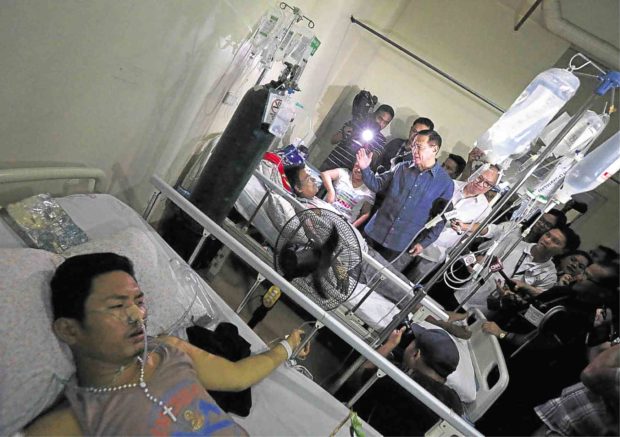
ALARMING Health Secretary Francisco Duque III visits leptospirosis patients at San Lazaro Hospital in Manila on July 2. —MARIANNE BERMUDEZ
The Department of Health (DOH) on Thursday declared leptospirosis outbreaks in several barangays in seven cities in Metro Manila, citing the rising number of deaths due to the bacterial, water-borne disease over the last two weeks.
According to Health Secretary Francisco Duque III, the cases in the following cities formed the basis of the declaration:
- Quezon City: Barangay Bagbag (3 cases), Bagong Silangan (5), Batasan Hills (9), Commonwealth (7), Novaliches Proper (4), Payatas (5), Pinyahan (3) and Vasra (4)
- Taguig City: Barangay Lower Bicutan (5), Western Bicutan (4), Maharlika Village (3) and Signal Village (4)
- Pasig City: Barangay Pinagbuhatan (4)
- Parañaque City: Barangay BF Homes (3) and San Dionisio (3)
- Navotas City: North Bay Boulevard South (3)
- Mandaluyong City: Barangay Addition Hills (3)
- Malabon City: Barangay Concepcion (3)
From Jan. 1 to July 3 this year, the DOH recorded a total of 368 leptospirosis cases—with 52 resulting in deaths—in the National Capital Region.
A sudden increase (105) was observed from June 10 to July 3, Duque said, noting that this was 38-percent higher compared to the average number of 76 cases reported in the past five years.
“These are already considered outbreaks because they have already breached the epidemic threshold, which means that the cases reported now in these cities and barangays have already gone past the average number for the last five years,” said Duque.
The DOH has alerted hospitals across the National Capital Region to be prepared to admit more patients, he added.
“Detection and reporting of cases were enhanced in health centers and hospitals. Additional medical personnel were deployed to the National Kidney and Transplant Institute along with drugs and medicines needed for treatment of cases,” he said.
Leptospirosis can be acquired by exposure to flood water, mud or food contaminated by urine of infected animals such as rats, pigs, dogs, cattle and goats. Sufferers usually feel flu-like symptoms, high fever, muscle pain, eye redness, yellowing of skin, tea-colored urine, decreased urine output, cough, diarrhea and vomiting.
If left untreated, leptospirosis may cause kidney failure, brain damage, massive internal bleeding and death.
The DOH reiterated warnings for the public to avoid wading in street floods and muddy areas, and to ensure that their food is well cooked and stored.
Meanwhile, the Philippine Health Insurance Corporation (PhilHealth) reminded members that it pays for claims for leptospirosis. Philhealth coverage for the disease is at P11,000, including the settlement of doctor’s fees, paid directly to the accredited health care institutions.
In 2017, PhilHealth paid a total of P21.8 million in social health insurance benefits for leptospirosis cases, up by 46 percent compared to P15 million it paid in 2016.